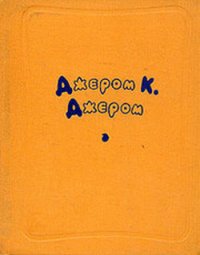Three Men on the Bummel - Jerome Jerome Klapka (бесплатные книги полный формат .TXT) 📗
"Another girl came up, an elder girl; and the first girl repeated to her what I had just said: she seemed quite excited about it. The second girl did not believe her-did not think I looked the sort of man who would want a cushion. To make sure, she put the question to me herself.
"'Did you say you wanted a cushion?' she asked.
"'I have said it three times,' I answered. 'I will say it again-I want a cushion.'
"She said: 'Then you can't have one.'
"I was getting angry by this time. If I hadn't really wanted the thing I should have walked out of the shop; but there the cushions were in the window, evidently for sale. I didn't see WHY I couldn't have one.
"I said: 'I will have one!' It is a simple sentence. I said it with determination.
"A third girl came up at this point, the three representing, I fancy, the whole force of the shop. She was a bright-eyed, saucy— looking little wench, this last one. On any other occasion I might have been pleased to see her; now, her coming only irritated me. I didn't see the need of three girls for this business.
"The first two girls started explaining the thing to the third girl, and before they were half-way through the third girl began to giggle-she was the sort of girl who would giggle at anything. That done, they fell to chattering like Jenny Wrens, all three together; and between every half-dozen words they looked across at me; and the more they looked at me the more the third girl giggled; and before they had finished they were all three giggling, the little idiots; you might have thought I was a clown, giving a private performance.
"When she was steady enough to move, the third girl came up to me; she was still giggling. She said:
"'If you get it, will you go?'
"I did not quite understand her at first, and she repeated it.
"'This cushion. When you've got it, will you go-away-at once?'
"I was only too anxious to go. I told her so. But, I added I was not going without it. I had made up my mind to have that cushion now if I stopped in the shop all night for it.
"She rejoined the other two girls. I thought they were going to get me the cushion and have done with the business. Instead of that, the strangest thing possible happened. The two other girls got behind the first girl, all three still giggling, Heaven knows what about, and pushed her towards me. They pushed her close up to me, and then, before I knew what was happening, she put her hands on my shoulders, stood up on tiptoe, and kissed me. After which, burying her face in her apron, she ran off, followed by the second girl. The third girl opened the door for me, and so evidently expected me to go, that in my confusion I went, leaving my twenty marks behind me. I don't say I minded the kiss, though I did not particularly want it, while I did want the cushion. I don't like to go back to the shop. I cannot understand the thing at all."
I said: "What did you ask for?"
He said: "A cushion"
I said: "That is what you wanted, I know. What I mean is, what was the actual German word you said."
He replied: "A kuss."
I said: "You have nothing to complain of. It is somewhat confusing. A 'kuss' sounds as if it ought to be a cushion, but it is not; it is a kiss, while a 'kissen' is a cushion. You muddled up the two words-people have done it before. I don't know much about this sort of thing myself; but you asked for a twenty mark kiss, and from your description of the girl some people might consider the price reasonable. Anyhow, I should not tell Harris. If I remember rightly, he also has an aunt."
George agreed with me it would be better not.
Chapter VIII
Mr. and Miss Jones, of Manchester-The benefits of cocoa-A hint to the Peace Society-The window as a mediaeval argument-The favourite Christian recreation-The language of the guide-How to repair the ravages of time-George tries a bottle-The fate of the German beer drinker-Harris and I resolve to do a good action-The usual sort of statue-Harris and his friends-A pepperless Paradise-Women and towns.
We were on our way to Prague, and were waiting in the great hall of the Dresden Station until such time as the powers-that-be should permit us on to the platform. George, who had wandered to the bookstall, returned to us with a wild look in his eyes. He said:
"I've seen it."
I said, "Seen what?"
He was too excited to answer intelligently. He said
"It's here. It's coming this way, both of them. If you wait, you'll see it for yourselves. I'm not joking; it's the real thing."
As is usual about this period, some paragraphs, more or less serious, had been appearing in the papers concerning the sea— serpent, and I thought for the moment he must be referring to this. A moment's reflection, however, told me that here, in the middle of Europe, three hundred miles from the coast, such a thing was impossible. Before I could question him further, he seized me by the arm.
"Look!" he said; "now am I exaggerating?"
I turned my head and saw what, I suppose, few living Englishmen have ever seen before-the travelling Britisher according to the Continental idea, accompanied by his daughter. They were coming towards us in the flesh and blood, unless we were dreaming, alive and concrete-the English "Milor" and the English "Mees," as for generations they have been portrayed in the Continental comic press and upon the Continental stage. They were perfect in every detail. The man was tall and thin, with sandy hair, a huge nose, and long Dundreary whiskers. Over a pepper-and-salt suit he wore a light overcoat, reaching almost to his heels. His white helmet was ornamented with a green veil; a pair of opera-glasses hung at his side, and in his lavender-gloved hand he carried an alpenstock a little taller than himself. His daughter was long and angular. Her dress I cannot describe: my grandfather, poor gentleman, might have been able to do so; it would have been more familiar to him. I can only say that it appeared to me unnecessarily short, exhibiting a pair of ankles-if I may be permitted to refer to such points-that, from an artistic point of view, called rather for concealment. Her hat made me think of Mrs. Hemans; but why I cannot explain. She wore side-spring boots-"prunella," I believe, used to be the trade name-mittens, and pince-nez. She also carried an alpenstock (there is not a mountain within a hundred miles of Dresden) and a black bag strapped to her waist. Her teeth stuck out like a rabbit's, and her figure was that of a bolster on stilts.
Harris rushed for his camera, and of course could not find it; he never can when he wants it. Whenever we see Harris scuttling up and down like a lost dog, shouting, "Where's my camera? What the dickens have I done with my camera? Don't either of you remember where I put my camera?"-then we know that for the first time that day he has come across something worth photographing. Later on, he remembered it was in his bag; that is where it would be on an occasion like this.
They were not content with appearance; they acted the thing to the letter. They walked gaping round them at every step. The gentleman had an open Baedeker in his hand, and the lady carried a phrase book. They talked French that nobody could understand, and German that they could not translate themselves! The man poked at officials with his alpenstock to attract their attention, and the lady, her eye catching sight of an advertisement of somebody's cocoa, said "Shocking!" and turned the other way.
Really, there was some excuse for her. One notices, even in England, the home of the proprieties, that the lady who drinks cocoa appears, according to the poster, to require very little else in this world; a yard or so of art muslin at the most. On the Continent she dispenses, so far as one can judge, with every other necessity of life. Not only is cocoa food and drink to her, it should be clothes also, according to the idea of the cocoa manufacturer. But this by the way.




